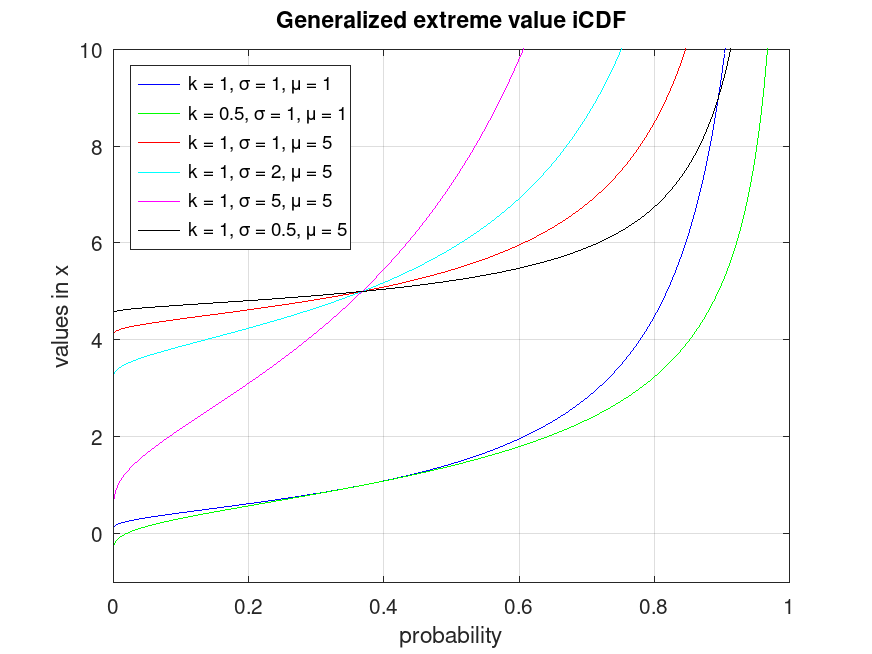Categories &
Functions List
- BetaDistribution
- BinomialDistribution
- BirnbaumSaundersDistribution
- BurrDistribution
- ExponentialDistribution
- ExtremeValueDistribution
- GammaDistribution
- GeneralizedExtremeValueDistribution
- GeneralizedParetoDistribution
- HalfNormalDistribution
- InverseGaussianDistribution
- LogisticDistribution
- LoglogisticDistribution
- LognormalDistribution
- LoguniformDistribution
- MultinomialDistribution
- NakagamiDistribution
- NegativeBinomialDistribution
- NormalDistribution
- PiecewiseLinearDistribution
- PoissonDistribution
- RayleighDistribution
- RicianDistribution
- tLocationScaleDistribution
- TriangularDistribution
- UniformDistribution
- WeibullDistribution
- betafit
- betalike
- binofit
- binolike
- bisafit
- bisalike
- burrfit
- burrlike
- evfit
- evlike
- expfit
- explike
- gamfit
- gamlike
- geofit
- gevfit_lmom
- gevfit
- gevlike
- gpfit
- gplike
- gumbelfit
- gumbellike
- hnfit
- hnlike
- invgfit
- invglike
- logifit
- logilike
- loglfit
- logllike
- lognfit
- lognlike
- nakafit
- nakalike
- nbinfit
- nbinlike
- normfit
- normlike
- poissfit
- poisslike
- raylfit
- rayllike
- ricefit
- ricelike
- tlsfit
- tlslike
- unidfit
- unifit
- wblfit
- wbllike
- betacdf
- betainv
- betapdf
- betarnd
- binocdf
- binoinv
- binopdf
- binornd
- bisacdf
- bisainv
- bisapdf
- bisarnd
- burrcdf
- burrinv
- burrpdf
- burrrnd
- bvncdf
- bvtcdf
- cauchycdf
- cauchyinv
- cauchypdf
- cauchyrnd
- chi2cdf
- chi2inv
- chi2pdf
- chi2rnd
- copulacdf
- copulapdf
- copularnd
- evcdf
- evinv
- evpdf
- evrnd
- expcdf
- expinv
- exppdf
- exprnd
- fcdf
- finv
- fpdf
- frnd
- gamcdf
- gaminv
- gampdf
- gamrnd
- geocdf
- geoinv
- geopdf
- geornd
- gevcdf
- gevinv
- gevpdf
- gevrnd
- gpcdf
- gpinv
- gppdf
- gprnd
- gumbelcdf
- gumbelinv
- gumbelpdf
- gumbelrnd
- hncdf
- hninv
- hnpdf
- hnrnd
- hygecdf
- hygeinv
- hygepdf
- hygernd
- invgcdf
- invginv
- invgpdf
- invgrnd
- iwishpdf
- iwishrnd
- jsucdf
- jsupdf
- laplacecdf
- laplaceinv
- laplacepdf
- laplacernd
- logicdf
- logiinv
- logipdf
- logirnd
- loglcdf
- loglinv
- loglpdf
- loglrnd
- logncdf
- logninv
- lognpdf
- lognrnd
- mnpdf
- mnrnd
- mvncdf
- mvnpdf
- mvnrnd
- mvtcdf
- mvtpdf
- mvtrnd
- mvtcdfqmc
- nakacdf
- nakainv
- nakapdf
- nakarnd
- nbincdf
- nbininv
- nbinpdf
- nbinrnd
- ncfcdf
- ncfinv
- ncfpdf
- ncfrnd
- nctcdf
- nctinv
- nctpdf
- nctrnd
- ncx2cdf
- ncx2inv
- ncx2pdf
- ncx2rnd
- normcdf
- norminv
- normpdf
- normrnd
- plcdf
- plinv
- plpdf
- plrnd
- poisscdf
- poissinv
- poisspdf
- poissrnd
- raylcdf
- raylinv
- raylpdf
- raylrnd
- ricecdf
- riceinv
- ricepdf
- ricernd
- tcdf
- tinv
- tpdf
- trnd
- tlscdf
- tlsinv
- tlspdf
- tlsrnd
- tricdf
- triinv
- tripdf
- trirnd
- unidcdf
- unidinv
- unidpdf
- unidrnd
- unifcdf
- unifinv
- unifpdf
- unifrnd
- vmcdf
- vminv
- vmpdf
- vmrnd
- wblcdf
- wblinv
- wblpdf
- wblrnd
- wienrnd
- wishpdf
- wishrnd
- adtest
- anova1
- anova2
- anovan
- bartlett_test
- barttest
- binotest
- chi2gof
- chi2test
- correlation_test
- fishertest
- friedman
- hotelling_t2test
- hotelling_t2test2
- kruskalwallis
- kstest
- kstest2
- levene_test
- manova1
- mcnemar_test
- multcompare
- ranksum
- regression_ftest
- regression_ttest
- runstest
- sampsizepwr
- signrank
- signtest
- tiedrank
- ttest
- ttest2
- vartest
- vartest2
- vartestn
- ztest
- ztest2
Function Reference: gevinv
statistics: x = gevinv (p, k, sigma, mu)
Inverse of the generalized extreme value (GEV) cumulative distribution function (iCDF).
For each element of p, compute the quantile (the inverse of the CDF) of the GEV distribution with shape parameter k, scale parameter sigma, and location parameter mu. The size of p is the common size of x, k, sigma, and mu. A scalar input functions as a constant matrix of the same size as the other inputs.
When k < 0, the GEV is the type III extreme value distribution.
When k > 0, the GEV distribution is the type II, or Frechet,
extreme value distribution. If W has a Weibull distribution as
computed by the wblcdf function, then -W has a type III
extreme value distribution and 1/W has a type II extreme value
distribution. In the limit as k approaches 0, the GEV is the
mirror image of the type I extreme value distribution as computed by the
evcdf function.
The mean of the GEV distribution is not finite when k >= 1, and
the variance is not finite when k >= 1/2. The GEV distribution
has positive density only for values of x such that
k * (x - mu) / sigma > -1.
Further information about the generalized extreme value distribution can be found at https://en.wikipedia.org/wiki/Generalized_extreme_value_distribution
See also: gevcdf, gevpdf, gevrnd, gevfit, gevlike, gevstat
Source Code: gevinv
Example: 1
## Plot various iCDFs from the generalized extreme value distribution
p = 0.001:0.001:0.999;
x1 = gevinv (p, 1, 1, 1);
x2 = gevinv (p, 0.5, 1, 1);
x3 = gevinv (p, 1, 1, 5);
x4 = gevinv (p, 1, 2, 5);
x5 = gevinv (p, 1, 5, 5);
x6 = gevinv (p, 1, 0.5, 5);
plot (p, x1, "-b", p, x2, "-g", p, x3, "-r", ...
p, x4, "-c", p, x5, "-m", p, x6, "-k")
grid on
ylim ([-1, 10])
legend ({"k = 1, σ = 1, μ = 1", "k = 0.5, σ = 1, μ = 1", ...
"k = 1, σ = 1, μ = 5", "k = 1, σ = 2, μ = 5", ...
"k = 1, σ = 5, μ = 5", "k = 1, σ = 0.5, μ = 5"}, ...
"location", "northwest")
title ("Generalized extreme value iCDF")
xlabel ("probability")
ylabel ("values in x")
|
